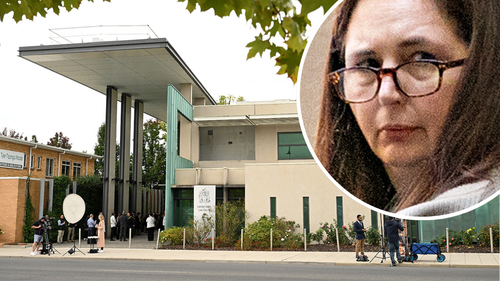Share this @internewscast.com
Various factors can influence the lethality of toxins found in death cap mushrooms, as discussed in Erin Patterson’s trial concerning three alleged murders by poisoning.
According to toxicologist Dimitri Gerostamoulos, variables such as a person’s age, weight, their resistance to the mushroom’s toxins, and the quantity consumed can all impact the outcome, as he informed a Supreme Court jury in regional Victoria today.
Fifty-year-old Patterson is currently at the midpoint of her trial, where she faces accusations of intentionally poisoning three members of her estranged husband’s family with a beef Wellington dish.

She has pleaded not guilty to three counts of murder and one of attempted murder over the July 2023 meal which led to the deaths of Don and Gail Patterson, 70, and Heather Wilkinson, 66, and hospitalisation of Heather’s husband Ian.
Patterson claims the deaths were all a terrible accident.
She took herself to hospital two days after the lunch and claimed she had eaten the same meal as her in-laws but was found to be well enough to be discharged by doctors on August 1.
A child protection worker yesterday said Patterson told her she’d eaten half of her serve of the beef Wellington, and complained of feeling unwell and experiencing loose bowel movements.
Defence barrister Colin Mandy SC today cross-examined Dr Gerostamoulos, the Victorian Institute of Forensic Medicine’s chief toxicologist.
He asked whether some individuals could be “less severely affected than others” after consuming death cap mushrooms because of the amount they had ingested.
“Yes that’s possible,” Dr Gerostamoulos said.
“The age of the individual might be a factor?” Dr Mandy continued.
“That can be a factor,” he replied.
Dr Gerostamoulos also agreed that the weight of the person may be a factor, as could the individual’s tolerance to the toxin.

Prosecutor Sarah Lenthall then re-examined the toxicologist.
“If two adults with no serious pre-existing health conditions consumed the same amount of the same meal, which contained death cap mushrooms, and one person dies – what are the health outcomes for the person who did not die?” she asked.
“There likely would be adverse outcomes for the person who survived, the severity of which may vary,” Dr Gerostamoulos replied.
More photos of the poisoned beef Wellington were shown to the jury today, as Plant Health Victoria diagnostics manager David Lovelock gave evidence.
He performed a second test on remains of the meal and found no sign of death cap mushrooms.
Dr Lovelock said he did find death cap mushrooms inside a food dehydrator, which had been seized by police from a tip days after the meal.
Another scientist, Camille Truong, also found no sign of death caps in the meal when examining it under a microscope.
However, Dr Gerostamoulos told the jury today he found death cap mushroom toxins inside the meal’s remains when he performed chemical testing.
Justice Christopher Beale sent the jury home for the weekend with a warning after one of their fellow jurors was dismissed for discussing the case with family and friends.
“I don’t want to sound like a broken record but only discuss the case with your fellow jurors in the privacy of the jury room,” he said.
The trial will resume on Monday.
LISTEN NOW: The Mushroom Trial











